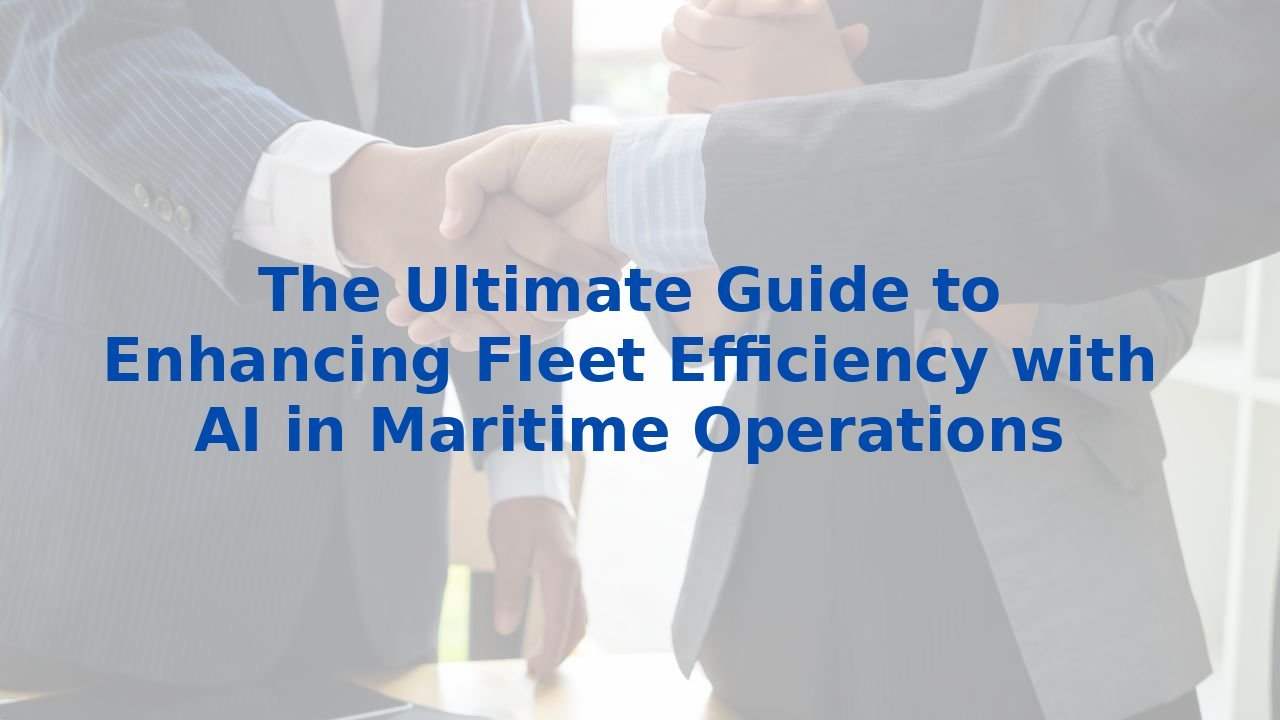The Ultimate Guide to Enhancing Fleet Efficiency with AI in Maritime Operations
The Ultimate Guide to Enhancing Fleet Efficiency with AI in Maritime Operations
Introduction
In today's fast-paced maritime industry, the push for operational efficiency and sustainability stands paramount. Many organizations are finding that integrating advanced technologies, particularly artificial intelligence (AI), into their fleet management processes isn't just desirable—it's essential. This blog post will discuss the core business processes inherent in fleet management, explore how AI can elevate these processes, and highlight the substantial benefits of AI in improving operational efficiency.
The Importance of Fleet Operations Centers
A Fleet Operations Center (FOC) functions as the nerve center for managing a fleet of vessels. By synthesizing real-time data from diverse sources such as speed, weather, navigation, and engine metrics, FOCs facilitate informed decision-making and strategic planning. Notably, this data-driven approach enables organizations to enhance fuel efficiency, improve route planning, and optimize logistics across various ports.
Advanced Technology in Fleet Operations Centers
Modern FOCs leverage state-of-the-art technology to monitor their vessels effectively. Key components include:
- Real-Time Data Collection: Utilizing sophisticated sensors and satellite technology, vast amounts of data on speed, weather, and navigation can be gathered seamlessly.
- Data Analysis: AI algorithms now analyze this data instantly, providing insights that help optimize fuel use, lower emissions, and improve route efficiency.
- Digital Simulations: Tools, such as tactical tables and ship simulators, enable the simulation of different navigation scenarios, ensuring preparedness for challenging conditions.
- Video Walls: These extensive displays present essential operational information, including weather forecasts and energy consumption, fostering a comprehensive understanding of fleet dynamics.
The Role of AI in Enhancing Fleet Operations
The infusion of AI into fleet operations can vastly elevate efficiency through:
- Automating Data Analysis: AI can process vast datasets swiftly and accurately, exposing patterns and insights that might elude human analysis.
- Predictive Maintenance: By analyzing engine room metrics, AI can foresee maintenance needs, reducing downtime and enhancing overall operational efficiency.
- Route Optimization: AI’s ability to analyze real-time data allows it to suggest optimal navigation paths based on current weather and traffic conditions.
- Environmental Compliance: Continuous monitoring of environmental regulations ensures adherence to standards, reducing the ecological footprint of operations.
Benefits of AI for Improving Efficiency
Integrating AI into fleet operations centers brings a plethora of benefits:
- Enhanced Decision-Making: Captains and officers equipped with real-time data can make quicker, informed decisions for safer and more effective operations.
- Increased Efficiency: AI-driven automation and optimized routing minimize time and resource usage, subsequently elevating productivity.
- Improved Safety: Predictive maintenance and advanced simulations mitigate risks, bolstering safety protocols and decreasing accident likelihood.
- Sustainability: Through better fuel management and emissions reduction, AI plays a crucial role in meeting sustainability objectives and protecting marine ecosystems.
Training Employees for AI
While the advantages of AI are clear, the human element is paramount. Training employees to engage effectively with AI is crucial for maximizing operational gains. Training should include:
- Understanding AI Systems: Employees require foundational knowledge about AI technologies and their applications within fleet operations.
- Data Interpretation: Ensuring staff can interpret and leverage AI-driven insights is vital for strategic decision-making.
- Collaboration with AI: Teaching teams how to work hand-in-hand with AI systems allows them to enhance their capabilities, fostering a collaborative instead of competitive atmosphere.
Conclusion
The modernization of fleet operations with AI technology represents a transformative opportunity for maritime organizations. The benefits—enhanced efficiency, improved decision-making, increased safety, and a sustainable approach to operations—are profound. Furthermore, investing in the training of employees to effectively harness the power of AI is not merely an option but a necessity. As the maritime industry advances, the role of AI in shaping fleet management will undeniably grow, paving the path for a future where technology and operational excellence coalesce harmoniously.



